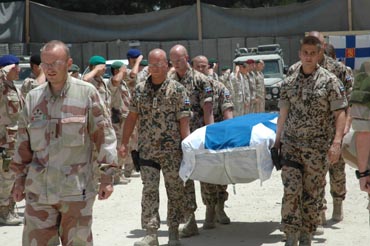The EUJUST Lex mission deployed throughout Iraq. But still disagree Soma
(BRUSSELS2) The EU judicial training mission "EUJUST Lex" is now deployed throughout Iraq. But the Europeans have still not succeeded in signing a general agreement fixing the status of the mission (SOMA) with the government. " This immunity agreement has not currently been approved » confirmed Hans-Jörg Haber, the civilian commander of EU operations during a session in the European Parliament at the Defense sub-committee last Thursday (9 February), explaining that « The Iraqis are keen to show their sovereignty as they did with the NATO mission by refusing to sign a SOMA agreement. But, unlike NATO, the European Union has not withdrawn its mission. On the contrary, it continues its training missions as explained by Laszlo Huszar, the new head of mission to MEPs.
The mission continues without agreement
If the heads of the administration seem inclined to reinforce the European presence, it is nevertheless necessary to go through the agreement of the deputies. And they are "suspicious" of anything that could represent a "Surrender", a legacy of the Ottoman Empire, as a European diplomat explained to B2. As a result, it drags. On the European side, we admit to having no " expected date to sign this agreement ". In the meantime, it's a mess. " Each operates with a national diplomatic passport or service passport ". EUJUST Lex being a non-executive mission, it is possible to operate for a few weeks without Soma. But that leaves a legal vacuum in case of a problem. And having such an agreement has practical consequences. “It makes life easier, for example for the passage from the green zone to the rest of the country, for example. This avoids complications and waste of time at the crossing point in particular ».
A Europe not yet very visible but better perceived than the Americans
Asked by MEPs about the Iraqi people's perception, Haber also explained that " we must remain modest. It's still too early to talk about visibility ". Adding " When your armored tanks or armored jeeps make an incursion outside the green zone, you are not specifically perceived. It's been 8 years that Iraqis have seen people behind their armored windows. We are not visible as Europeans but visible as foreign visitors. What seems certain, however, is that Europeans are better perceived than others. " Iraqi civil servants are more receptive (to the European presence). We are perceived differently from Americans. "" It's not Americanism, but simply because (these) have been around too long. » wishes however to specify H. Haber who has not forgotten the basics of his job as a diplomat... The Europeans however have a « big advantage about the Americans, he says, we are better at training the specialized police, on financial issues for example”.
Liaise with the judiciary
This is one of the questions that taps » the Europeans in this mission: « how to ensure the link with the judiciary ". " We must improve the interface between law enforcement and the judiciary, raise the awareness of the police on the spot to the need to let the judges do the work at some point. And this is particularly difficult. (...) If we don't hand over to the judges at some point, the force is too present. And this is a visible defect. “A task therefore necessary but where the Europeans themselves are struggling … for lack of personnel. " Unfortunately, it is very expensive for the Member States to second high-level magistrates to the country who could carry out this work.. (They) can't get rid of enough staff to do the training. As for talking about an exit strategy, it is really too early, given the short existence of this mission. It was only very recently that the decision to deploy it effectively in the field was taken. Previously, the training of police officers or judges was carried out "off shore".
The EUJust Lex mission is one of the "discreet" missions of the European Union. Led by the Hungarian Laszlo Huszar, its objective is to develop criminal justice within the framework of the rule of law. It employs around fifty people and has a budget of 27,2 million euros (from July 2011 to June 2012). It is based in Baghdad with an office in Erbil (Kurdistan) and Basra (southern Iraq).
Read also:

